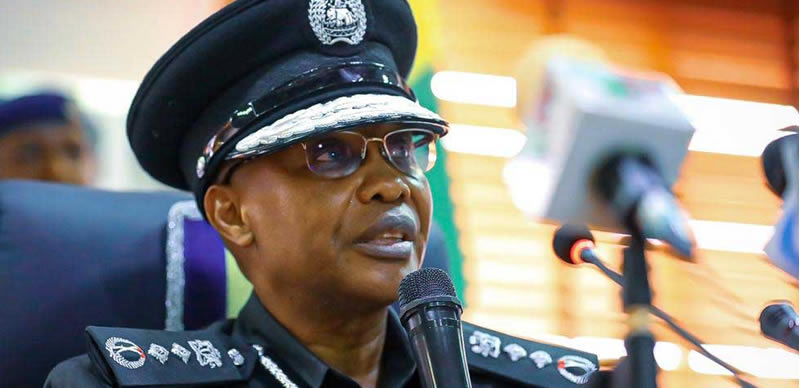The Federal Government has slashed the budget proposed by the Nigeria Police Force by almost N93bn, a situation which the security outfit has warned may frustrate its efforts towards effectively tackling the growing insecurity in the country.
The police blamed the reduction largely on the envelope budgeting system of the government and urged the National Assembly to exclude the NPF from it.
In a presentation made to the National Assembly, the Inspector-General of Police, Usman Baba, decried the slashing of outfit’s proposed budget by the Budget Office of the Federation from N889,681,595,517.74 to N796,785,034,379.56, warning of its impact on the security outfit and its consequence for the country.
Baba made this known to the Senate and House of Representatives Committees on Police Affairs on Tuesday behind closed doors while defending the proposed budget of the NPF in the 2023 Appropriation Bill.
Our correspondent sighted parts of his presentation to the lawmakers on Saturday.
While the police are statutorily in charge of internal security, the Armed Forces are to protect the territorial integrity of the country, against external aggression.
However, several security committees of the National Assembly and Service Chief have on different occasions expressed dissatisfaction that the military was now involved in internal operations in almost all the 36 states of the federation.
For instance, the Chairman of the House Committee on Defence, Babajimi Benson, had after a 2022 budget defence session with the Defence Space Administration, on November 9, 2021, said the Armed Forces were carrying out the duties despite their limited resources.
“In Nigeria, if there is kidnapping or banditry, everyone calls the Armed Forces. Roles that are traditionally assigned to the police, our Armed Forces are the ones embarking on them,” he partly said.
Meanwhile, the Ministry of Defence and the Armed Forces have been allocated over N1.248tn in the budget.
Out of the 18 military and defence organisations allocated the total sum, the Nigerian Army, Nigerian Air Force and the Nigerian Navy will get the largest chunk of the record military budget, with N638,108,156,198, N174,423,669,604 and N158,790,615,183, respectively.
IGP laments reduction
However, the IGP told the lawmakers that the total minimum projection of the police for the 2023 budgetary year was N889,681,595,517.74, but was reduced by N92,896,561,138.18.
“This was, however, reviewed to N796,785,034,379.56 under the envelope budgetary system by the Budget Office of the Federation,” he said.
Out of the reviewed amount of N796,785,034,379.56, N28,008,261,559.82 is for capital expenditure, while N33,653,116,116 is for overhead cost, with the balance of N735, 123,656,703.74 for personnel cost.
Baba said, “The overhead cost estimate as computed under the envelope budgetary system is grossly inadequate to meet the operational, logistics, and administrative requirements of the force in the year 2023.
“To appreciate this challenge, the Joint Committees on Police Affairs are to humbly note, for instance, that as at today, the force has a fleet of 13,935 vehicles and 1,520 motorcycles nationwide. The minimum cost implications for fuelling for the sustenance of minimal patrol operations per year of these patrol assets is N34,099,946,150.00. Similarly, the monthly minimum maintenance cost for the operations of the fleet of operational vehicles and motorcycles of the force is computed at N8,258,580,000.
“Going by the above computation, the entire sum of N33,653,116,116.00 that is being projected for all subheads in the overhead cost for police formations and the 36 state commands and the FCT in the 2023 budget is not even enough to provide minimal fuelling and maintenance cost for police operational vehicles/motorcycles for seven months.
“This is not to mention other critical subheads such as local travel and transport allowances, international and local training costs, maintenance of buildings (offices and barracks), aircraft, marine boats, feeding of detainees nationwide as well as provision of uniform and accoutrement, which the same subhead is projected to cover.”
Arms, intelligence affected
The police boss also criticised the N35,705,675,512 allocation to capital expenditure of the NPF in 2023.
“This figure is also grossly inadequate to meet the capital cost of the force in relation to the acquisition of critical operational assets including patrol vehicles, arms and ammunition, aircraft, intelligence/surveillance equipment as well as infrastructural items to optimally meet our policing mandate, particularly in the face of current complex security and criminal threats that the Force is dealing with across the country,” Baba stated.
Police’ challenges
The IGP stated the three critical challenges that police had been facing over the years, including inadequate budgetary appropriation “which does not support the optimal service delivery and police modernisation and reform plan of the force.”
Baba noted that while there had been a steady improvement, particularly in relation to overhead cost in recent years, “the capital allocation has continued to dwindle.”
The police boss also mentioned the envelope budgetary system of the Federal Government “which gives a funding ceiling to the Nigeria Police without due cognisance of the scope of the omnibus and complex mandate of the force, as well as the severity and scope of the internal security realities that the force is mandated to contend with as the lead internal security agency.”
Baba also decried the non-release of appropriated funds which, he said, impacted institutional planning, operational preparedness and budget implementation.
Punch

